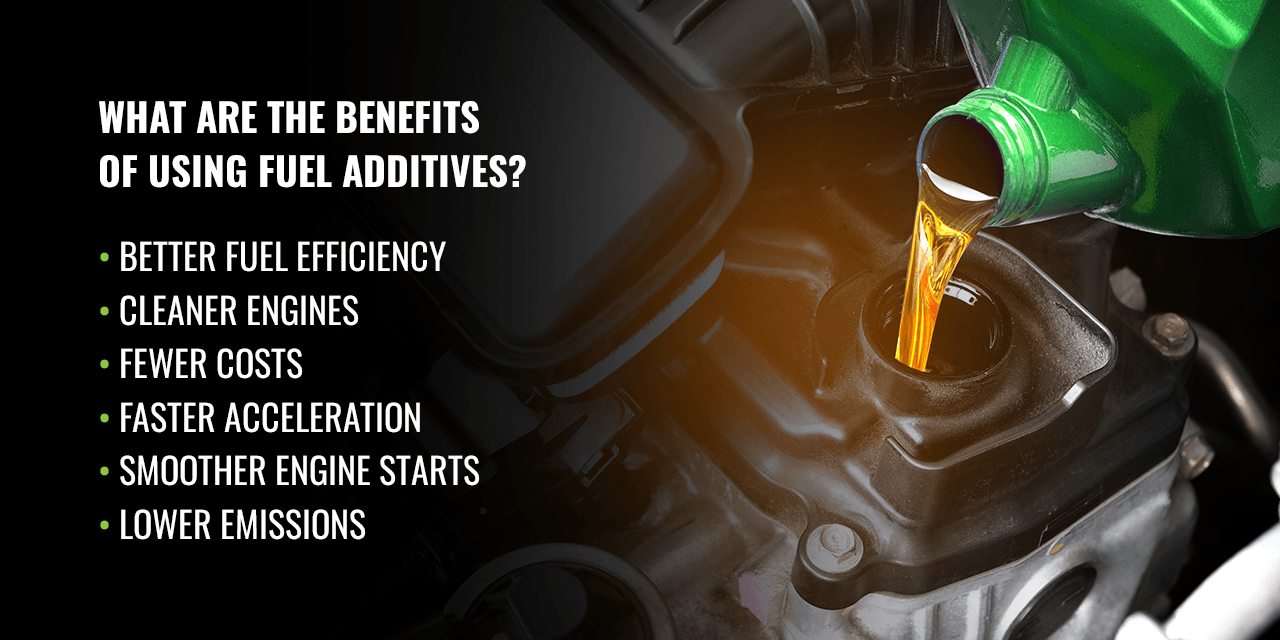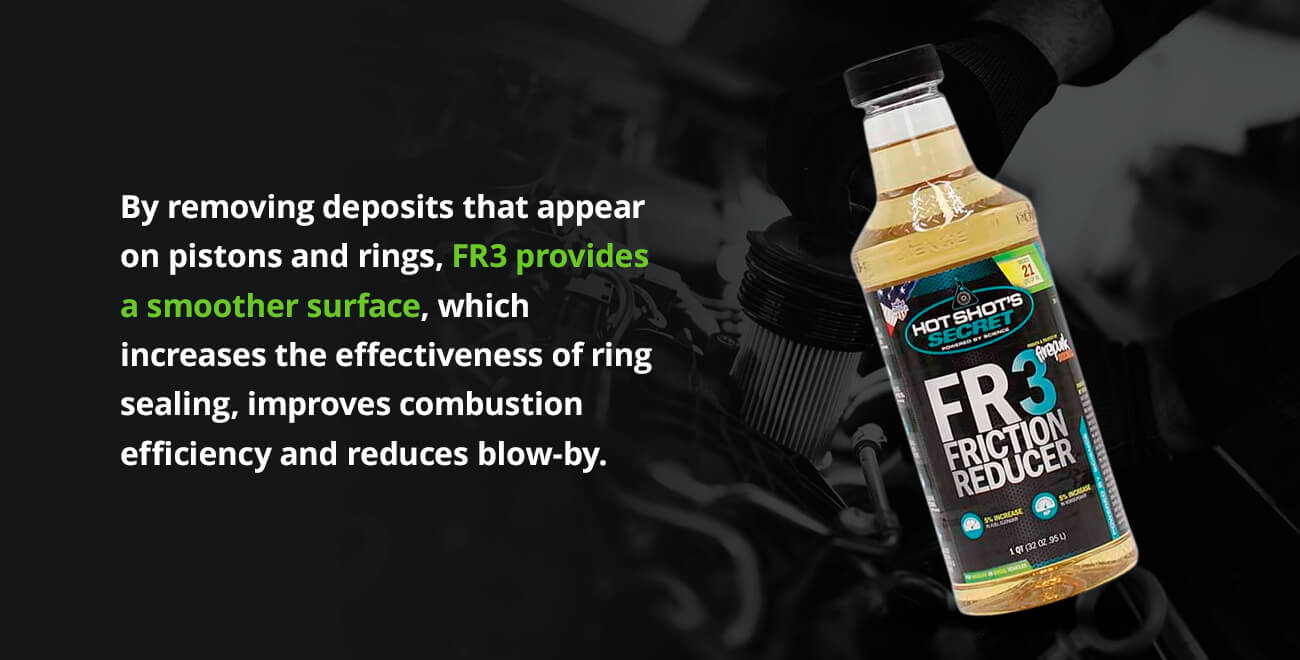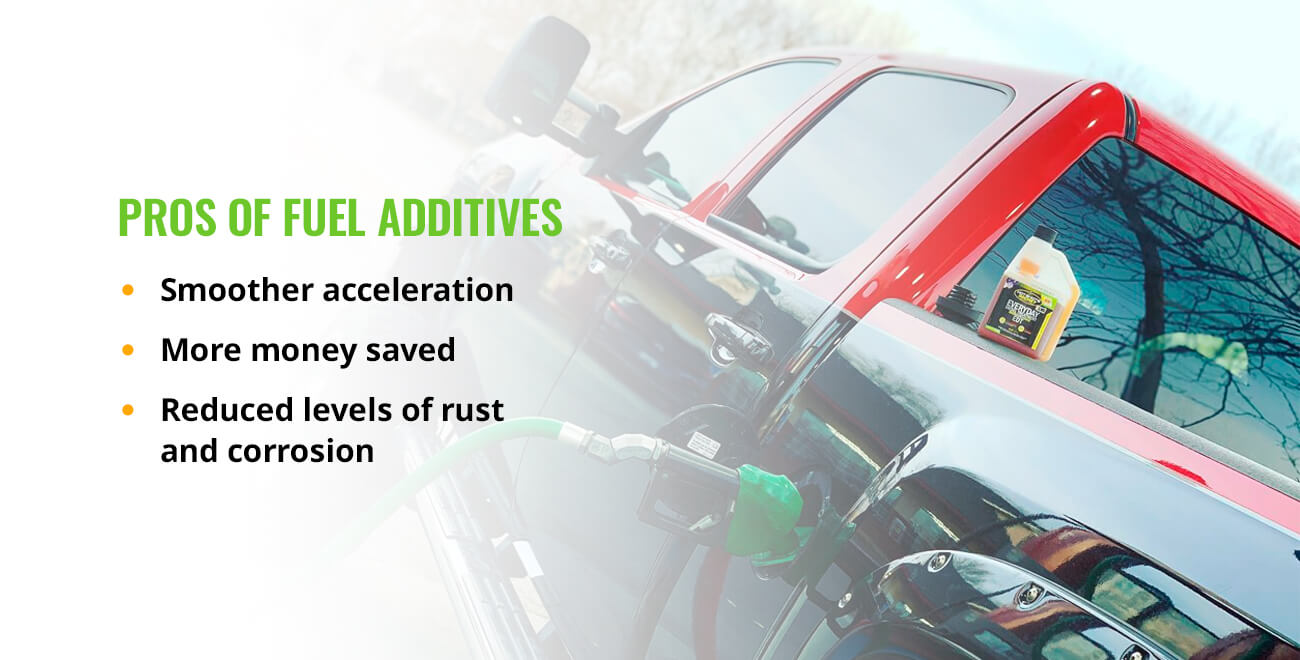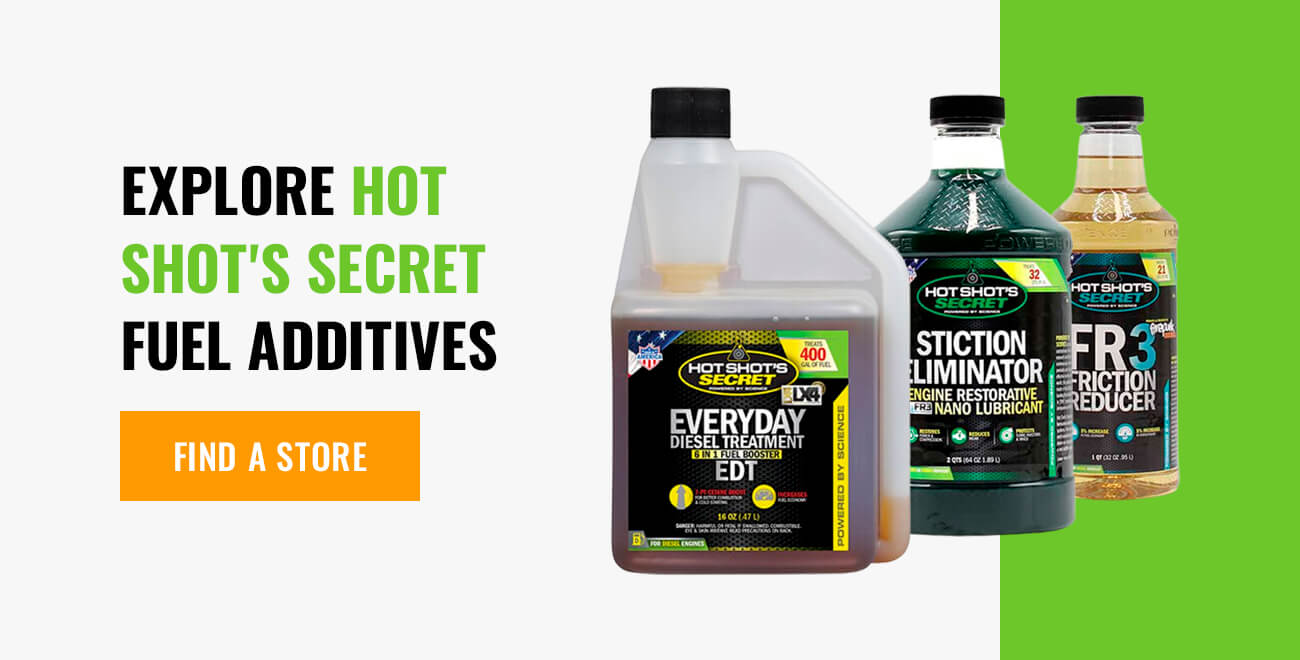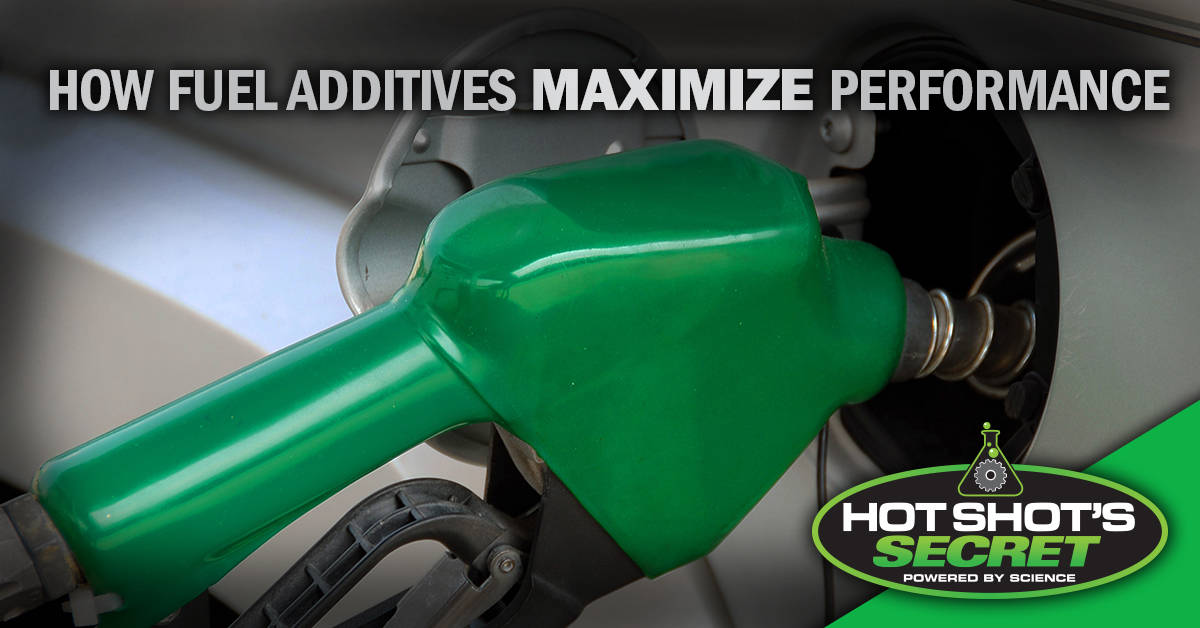
Here at Hot Shot’s Secret, we know fuel additives are a controversial topic. Some people are diehard additive fans, while others believe they’re a gimmick.
J.C. Counts, owner and operator at TD Diesel in Newberry, South Carolina, says customers frequently ask him to use specific additives even though they’re not sure what those products are supposed to do.
“It puts me in an awkward position because I know their request is for a substandard product,” Counts says. “They simply recognize the name on the shelf and nothing about the product itself.”
Fortunately, real, trustworthy additives do exist. Discover the benefits of using the right additives in the proper applications.
What Are Fuel Additives?
A fuel additive is a product you introduce to your system to improve performance. Different additives can clean your engine, lubricate your system or even increase your gas mileage. Most common additives are created for diesel engines, but additives for gasoline-powered vehicles are also available.
Manufacturers design fuel stabilizers to maintain a vehicle’s fuel condition during long-term storage when someone doesn’t plan to drive it. The more common types of fuel additives are fuel performance enhancers. Companies design these to improve your engine’s capabilities while it’s running.
There are two main types of additives you can use in your vehicle: fuel additives and motor oil additives.
Fuel Additives
EPA regulations require that diesel fuel contains ultra-low levels of sulfur. The issue is that the sulfur removal process introduces hydrogen into the fuel, which reduces the fuel’s natural lubricity.
Biodiesel contains moisture, but ethanol and methanol configurations require dry fuel. With the various hydrocarbons and polar solvents in the fuel mixtures, the unknown characteristics of the fuel at the pump can cause some impactful and sometimes damaging results in your engine. The right fuel additive helps to restore lubricity removed in the fuel refining process. It can help to disperse moisture, boost cetane levels, remove internal deposits and build up and stabilize various fuel blends. These factors increase the motor’s efficiency and prevent breakdowns without damaging any part of the system.
Counts says that he sees a huge difference in mileage when using fuel additives in diesel vehicles.
“I can tell I have improved throttle response,” Counts says. “My fuel filters are cleaner at replacements, and specific to my vendor’s additives, mine are nearly as clean and white as when I first installed it.”
Motor Oil Additives
The essential function of motor oil is to flow easily through the motor to lubricate the friction between moving parts and dissipate heat throughout. Using the proper additive can significantly improve the performance of that oil.
Motor oil additives help improve viscosity, reduce the friction created by moving parts and cool the engine during daily operations. These additives work by creating increased lubricity bonds between the source oil compounds, which allows the oil to flow more smoothly through the motor.
Do Fuel Additives Work?
Some drivers are skeptical of fuel additives to the history associated with the products. In the early days, some disreputable companies and individuals sold fuel additives that were little more than snake oil. However, these days, buyers can find many reliable, trustworthy manufacturers that offer excellent fuel additives. As technology, market testing and scientific research advanced, manufacturers harnessed them to produce high-quality fuel additives well worth the money.
Besides these historical concerns, some fuel additive skeptics criticize fuel additives without giving them time to do their job. Many of these critics expect fuel additives to work immediately, providing all their benefits to their engines as soon as they use the product. The problem with this sort of thinking is that fuel additives need time to provide more noticeable advantages.
When you first put fuel additives in your vehicle, don’t expect to notice an immediate difference. Most vehicles need to cycle through multiple tanks of treated fuel before the additives start to show significant performance improvements. The bottom line is that fuel additives work, but you need to have a little bit of patience.
The Science Behind Fuel Additives
As a complex piece of machinery, your vehicle’s engine needs to be maintained to perform properly. For diesel fuel applications, the factories are obligated to distribute the newer ultra-low sulphur fuel with less lubricity. Biodiesel contains moisture. Ethanol and methanol configurations require moisture to be removed from your fuel. With the different hydrocarbons and polar-solvents in the fuel mixtures, the unknown properties of the fuel at the pump can cause some harmful results in your engine. However, the correct additives can help distribute the moisture, boost cetane, remove the internal deposits and buildup, and support the various fuel blends, so the motor operates more efficiently, with less damage and more prevention breakdowns. Especially with diesel fuel, the proper additive helps restore the lubricity filtered out of the fuel from the refinery.
But not all fuel additives are created equal. Trustworthy manufacturers and scientifically proven formulas are the recipes for high-quality fuel additives. Bottom line, when proper research and science goes into a product, your vehicle will perform better.
What Benefits Do Fuel Additives Provide?
Many vehicle owners rely on fuel additives for several advantages. Since fuel additives are simple to use, almost anyone can add them on their own and reap the benefits. Some of the primary advantages include improving fuel efficiency, increasing an engine’s cleanliness and raising a vehicle’s performance.
Below are some of the top potential benefits of using fuel additives.
- Better fuel efficiency: One primary advantage of using fuel additives is their ability to improve your engine and fuel efficiency. Fuel additives can help your engine use every drop of gas or diesel. When the fuel goes through the combustion process, fuel additives help the vehicle burn the fuel more completely and add extra power to the engine. As a result, some fuel additives can even help you increase your vehicle’s miles-per-gallon rating.
- Cleaner engines: High-quality fuel additives can help your engine run much more cleanly. Manufacturers design these additives to prevent trace and gunk deposits in your engine, helping stop them from building up and negatively impacting your engine’s performance. Alongside eliminating harmful deposits, fuel additives can get rid of any buildup that existed before using the additive.
- Fewer costs: Fuel additives can help you lower the overall costs of vehicle ownership. By using fuel additives, you won’t waste fuel due to partial combustion or see performance issues related to contaminants collecting in the engine. When you use more of your fuel and prevent buildup, you get more money out of your gas or diesel and reduce the chances of expensive repair costs. Fuel additives are also very affordable, making them well worth the initial expense.
- Faster acceleration: When engines run without any fuel additives, carbon deposits and dirty plugs can lead to poor performance on the road, particularly during acceleration. The best fuel additives clean contaminants out and ensure complete combustion. These improvements help you accelerate faster and get the most out of your vehicle.
- Smoother engine starts: Another great reason to use fuel additives is their ability to combat carbon buildups that affect how your engine starts. Fuel system cleaners can remove carbon from valves, rings and cylinders. By removing and preventing carbon buildup, your cylinder head compression will increase, leading to an engine that turns over faster when you start it up.
- Lower emissions: When your tailpipe is pumping out more clouds than usual, your engine’s combustion chambers likely have emissions-increasing deposits in them. Fuel additives clear out carbon buildup and can help you reduce the emissions your vehicle puts out.
Hot Shot’s Secret Fuel Additives & Benefits:
Here’s a list of our top additive picks and the benefits you can expect to see from each:
FR3 Friction Reducer
FR3 Friction Reducer is an oil additive with patented synthetic lubricants that increase the host oil’s ability to lubricate and reduce wear in your engine.
Its unique lubricating properties come from Group 5 synthetic esters, which are negatively charged particles that adhere to your engine’s internal system to lubricate it. Those esters also increase the lubrication of your rubber seal and prevent oil leaks by slightly swelling the seal.
FR3’s patented carbon nanoparticle close microscopic holes on the machine’s surface, which creates a smooth film that the lubricant can attach to. This process reduces wear rates by 43% according to the ASTM G-133 test.
Our nanoparticles crosslink together, which allows the formula to increase system lubrication and film strength. The synergistic nature of these components improves performance in friction reduction, shear stability, film strength and oxidation stability.
By removing deposits that appear on pistons and rings, FR3 provides a smoother surface, which increases the effectiveness of ring sealing, improves combustion efficiency and reduces blow-by.
Reducing friction also lowers operating temperatures and enhances the oxidative stability of your host oil, which can extend the life of your engine. Plus, regular use of FR3 frequently results in 5% horsepower and fuel mileage gains, as demonstrated in dyno and road testing.
Everyday Diesel Treatment
Everyday Diesel Treatment (EDT) helps replenish the lubricity lost in creating ultra low sulfur diesel (ULSD) and biodiesel.
The removal of sulfur, and hence the loss of lubricity, from diesel fuel causes increased friction between all the moving parts in your fuel system. Plus, lower sulfur fuel is unable to dissolve the waxy soap deposits that form in fuel systems and are very difficult to filter. Most diesel fuel contains at least a portion of biodiesel, which contains glycerides.
We formulated Hot Shot’s Secret Everyday Diesel Treatment to work as an injector cleaner, cetane improver, neutral and sulfur-free lubricity agent, water dispersant, rust and corrosion inhibitor and fuel stabilizer.
EDT’s injector cleaner cleans diesel injector and waxy soap deposits from all parts of your fuel system, including your upper cylinders, fuel tank, fuel pumps and lines. It also returns asphaltenes and glycerides into the solution, which prevents an excess from forming. When your diesel fuel is clean, your system can be free of filter plugs and injector deposits. The injector cleaner also neutralizes acids produced by hydrodesulfurization, which prevents carboxylic salts from forming in your system.
Independent testing on EDT showed a restoration of up to 67% lost power in the Peugeot CEC F98-08 DW-10 test. The product also passed the ASTM D2068 Filter Blocking Test.
In most states, diesel fuel contains cetane levels of around 42 to 45. While the minimum required level is 40, most diesel engines operate more efficiently with levels of 48 to 50. To guarantee your engine’s most effective performance, EDT contains a cetane improver that can raise your cetane number by four to seven points.
There are many benefits to increasing cetane numbers. For example, cold starting your car using higher cetane fuel produces less black smoke because it will improve your combustion efficiency. Additionally, using EDT in your fuel can decrease the presence of hydrocarbons and particulate matter in your exhaust, which reduces the risk of blocking your diesel particulate filter by 50%.
Increased cetane levels can also improve fuel mileage and power. In fleet tests using EDT, fuel mileage improved up to 7.3%, and power increased up to 12.3%. This happened due to the combination of Hot Shot’s Secret injector cleaner and cetane improver, which also restores throttle response.
Further, EDT’s cetane improvement effect provides a smoother, less erratic pressure buildup in the combustion chamber during the ignition delay period between injection and ignition.
Stiction Eliminator
Hot Shot’s Secret’s original Stiction Eliminator is a safe, effective injection cleaner that breaks down stiction formations on any oil-wetted component. As a result, it scored a 92% clean rating on the ASTM D4828 scrub test. Using a Group V synthetic ester, Stiction Eliminator returns important additives and deposits to your solution, which reduces friction and lubricates your system.
When International Truck and Engine requested a product to eliminate stiction-caused warranty and performance issues in the powerstroke and navistar hydraulic electric unit injectors (HEUI), we created Stiction Eliminator. The formula removes the friction created from sticky byproducts of burnt oil, thus eliminating the black smoke, bucking and chugging you might experience when hard starting.
Stiction Eliminator is not a flush that contains harsh solvents which can potentially harm your engine. It’s a long-lasting solution that cleans away the gum, stiction and varnish and stiction built up in your system while lubricating the engine. Because you can leave Stiction Eliminator in your system for the duration of your oil’s life, it’s an inexpensive way to prevent stiction issues in the future. It can also help to reduce spool time while building maximum boost sooner in the RPM range.
Stiction Eliminator also returns HEUI injectors to factory standards and optimizes engine performance by restoring injector oil flow. This restoration corrects injector timing, injector spray patterns and fuel flow.
Those benefits hold true for more than just HEUI injectors since stiction can appear on many other engine components. For example, high-temperature turbocharger bearings that operate with tight tolerance are known to experience severe stiction buildup.
Whether you use it to solve existing problems or to prevent future ones, Stiction Eliminator will thoroughly protect and clean your diesel engine.
Primary Types of Fuel Performance Enhancers
When you look for a fuel performance enhancer for your vehicle, you’ll encounter a few different options. Fuel system cleaners and fuel injection cleaners are the two primary types you’ll find on the market. As you decide which one is right for your vehicle, you probably want to know the differences between them before you make a purchase.
As you shop for fuel performance enhancers, take a moment to review the primary categories below.
Fuel System Cleaners
Fuel system cleaners are among the most popular additives. Companies design these cleaners for scrubbing buildup, primarily carbon, from your fuel system to improve a vehicle’s performance. Alongside removing buildup, fuel system cleaners also prevent deposits from forming. If you have a fuel-injected engine or your engine runs on ethanol, fuel system cleaners are especially effective. Since ethanol-containing gas can cause buildup in the engine’s combustion chambers, fuel injectors and intake valves, it’s crucial to clean them out.
Fuel Injection Cleaners
Fuel injection cleaners are fuel system cleaners specifically made to remove built-up carbon on the engine’s fuel injectors. When you don’t use these cleaners, the carbon can harm your fuel economy significantly, leading to less fuel mileage. Drivers with high-performance engines featuring overhead cam setups can see considerable carbon accumulation. Additionally, cars that go on shorter trips, where the engine can’t warm up enough to clean itself, can have more buildup in them. These vehicles can benefit significantly from fuel injection cleaners.
Who Can Use Fuel Additives?
We’re fuel additive fanatics, but we acknowledge that some people can benefit from additives more than others. You’ll see the best results if:
- You live in extreme climates: If you drive a diesel-powered vehicle and live in an area that experiences harsh winters, an anti-gel additive can help prevent clogged fuel filters and improve lubricity.
- You drive an older vehicle: Additives can help to reduce engine and fuel system wear and extend the life of your car. An injection cleaner or high-quality lubricant would be a good choice for you.
- Your vehicle is idle for long periods of time: Starting a car up after a long time has passed between drives can be a difficult experience. Occasional use of a cetane-boosting fuel stabilizer can help to improve startups and maintain your engine’s performance.
- You mostly use your vehicle for short trips: Because the engine doesn’t get hot enough to clean itself during short trips, carbon can build up under the hood. Using an injection cleaner can help to eliminate those deposits and keep your engine squeaky clean.
If your vehicle is new, you don’t need additives. You can use them, but the benefits won’t be as noticeable since your vehicle’s performance is already at its peak.
You also may not need certain additives if you live in a region with a moderate climate. For example, if you live in an area where winters are harsh but spring and summer are mild, you only need to use additives in the winter. Ultimately, consult with a trusted mechanic to ensure you’re using the right product for your vehicle.
Pros of Fuel Additives
In addition to increased mileage and improved lubricity, high-quality additives can provide some of the following benefits:
- Smoother acceleration: With a cleaner engine, you’ll be able to push your vehicle to higher speeds easier.
- More money saved: Since your fuel will cycle more effectively through your engine, you can use all the fuel in your system. And that means you’ll need to visit the pump less often.
- Reduced levels of rust and corrosion: Using an engine-cleaning additive will help keep your engine in pristine condition.
Of course, the benefits you experience depend on the products you use and the problems you’re trying to solve.
Cons of Fuel Additives
It’s a common misconception that using fuel additives while your car is still new can void your warranty. In reality, if your car is damaged, your warranty can only be voided if your original equipment manufacturer (OEM) can prove that the additive was the cause of the problem. So if you have a newer vehicle, you can rest assured with the knowledge that pouring a little Stiction Eliminator in your engine is safe.
Another issue that many people run into with additives is the sheer amount of additives on the market today. It can be overwhelming to choose the right additive for your engine when there are so many similar products that promise to do the same thing. Researching each different product can help pin down which ones could benefit you.
Need a starting point? Check out our online Diagnose Your Diesel tool for recommendations.
One more thing to keep in mind is that additives from less reputable companies can contain damaging chemicals. Make sure you do your research before choosing any additive. We at Hot Shot’s Secret formulate all our additives with high-quality ingredients and subject each product to multiple rounds of rigorous testing before putting them on the market.
When Should You Use Fuel Additives and Fuel Injector Cleaners?
Fuel additives are appropriate for all vehicles, whether they run on diesel or gas. If you’ve never used them, it’s time to start, as they can provide significant advantages to your engine. To get the most value out of your fuel additives, you need to use them at the appropriate intervals.
To help you determine how often you’ll need to use fuel additives, take stock of how often you tend to drive your car. If you usually drive short distances and infrequently run the engine, you’ll likely want to use your additives more regularly. Since brief, infrequent drives cause more deposits to build up and don’t fully warm up your engine, it’s generally wise to use your fuel additives every 3,000 miles.
The same fuel additive interval applies if you operate your vehicle in lots of stop-and-go traffic or if you drive in cold weather. When you commute in these conditions, they can cause deposits to gather on your valves and fuel injectors. If left unchecked, these deposits can make your vehicle create more pollution and lose its fuel economy and power. While 3,000 miles isn’t always necessary, using fuel additives at this interval can serve as a kind of insurance for your engine’s performance.
Drivers who tend to drive on the highway more, going for long drives and using their car more frequently, can usually go longer between fuel additive intervals. Even in these conditions, deposits can still form in your engine, and you must take steps to prevent them. Generally, using fuel additives every 5,000 miles is appropriate for more frequently used vehicles and those regularly driven on the highway.
Your fuel additive needs often change based on the brand you select. Always check the manufacturer’s recommendations for use to ensure you get the best performance out of your fuel additives. You can also find some fuel additives that you can use every time you fill up your diesel engine, such as Everyday Diesel Treatment, to improve power, performance and fuel economy.
Explore Hot Shot’s Secret Fuel Additives
Are additives worth it? If you want your vehicle to run better, reduce the total cost of ownership, avoid breakdowns, and stay on the road longer, then the answer is yes. Check out our testimonials to hear from real people who love our additives.
Ready to dive in? Browse our selection of additives to find your fuel’s next secret ingredient.

